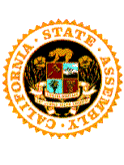ASSEMBLY
CALIFORNIA LEGISLATURE
SHEILA JAMES KUEHL
ASSEMBLYMEMBER, FORTY FIRST DISTRICT
Speaker Pro Tempore

September 2, 1998
The Honorable Pete Wilson
Governor of California
State Capitol
Sacramento, CA 95816
RE: AB 2192, The Radioactive Materials Transportation Safety Act of 1998
Dear Governor Wilson;
I am writing to request your signature on AB 2192, the Radioactive Materials Transportation Safety Act of 1998. AB 2192 provides, for the first time, statewide safety measures for the transport of spent nuclear fuel and high-level radioactive materials. The safety provisions of AB 2192 concur with the Western Governors' Association resolutions you have supported that acknowledge the need for strricter safety standards for the transportation of the dangerous materials.
Furthermore, the provisions of AB 2192 reflect many of the increased security measures taken for the July rail shipments of foreign spent fuel that crossed northern California as part of the Atoms for Peace Program. However, unlike the Concord shipments, AB 2192 ensures that these heightened standards are guaranteed -- not optional. In protecting the people of California, the state should mandate the highest safety standards possible.
Under the federal Nuclear Waste Policy Act, thousands of shipments of spent fuel will travel from reactors to a federal storage site beginning as soon as a site is established. Though few accidents involving spent fuel have occurred in the past, the increased volume of shipments would create a greatly increased risk. The Department of Energy estimates a possible 175 to 355 accidents for this large volume of shipments. DOE has also stated that the cost of even a small incident, with a minor release of radiation, could be 620 million dollars and take over 400 days to clean up. The provisions of AB 2192 decrease the chances of accidents and , in the event that an accident occurs, ensure that an emergency response would occur as quickly as possible.
Specifically, AB 2192 ensures that CHP security experts and radiation safety experts will escort shipments. Current federal standards only require one escort for shipments traveling through in rural areas. Due to the real danger of terrorist attack, shipments would be fully escorted along the entirety of the transport route. The current transportation plan for carrying the spent fuel from reactors throughout the country to an interim or permanent site in Nevada would bring all of the nations spent fuel through the Barstow area before turning northeast into Nevada. In order to protect California from the plethora of shipments of spent fuel on this Barstow route as well as from California reactors, AB 2192 requires inspections of vehicle maintenance and radiation safety at point of entry or point of origin. In order to assess most accurately the safety of rail shipments, AB 2192 adds inspection of tracks by PUC inspectors, who are already trained for this duty.
AB 2192 also requires electronic monitoring of shipments to guarantee an expedient emergency response. Such monitoring is highly recommended by the Department of Energy. I have worked with emergency responders to recognize the immense need for second responder training - such as the best way to fight a fire involving a spent fuel shipment. In doing so, I have included in AB 2192 training programs targeting responders along the routes of transport which would be implemented within a set timeframe prior to shipment.
Finally, as recommended by the Western Governors' Association's resolution, AB 2192 requires that shippers use casks of which on example has been full-scale physically tested. The casks shield the public from the potentially deadly radioactive materials inside. The Concord spent fuel shipment this summer showed us that the public lacks confidence in shipments conducted in casks which have not been full-scale tested. It is more than reasonable to ask that at least one example of the casks be tested. The costs of the provisions of the bill are fully covered by user fees, paid by the shipper on a per-cask basis. Shipments occur only after fuel has cooled for an extended period of time. Therefore, DIIS can accurately estimate how many shipments and thus, divide the user fee accordingly, so that no shipper bears an undue burden of the cost.
AB 2192 has received strong bipartisan support and support from local government, emergency responders and environmental organizations including the California State Firefighters' Association, California Professional Firefighters, California Organization of Police and Sheriffs, California State Association of Counties, Los Angeles County, Yolo County, San Bernadino County, Inyo County, the cities of Irvine and Santa Ana, Sierra Club, Planning and Conservation League, Women For, and Woman's Action for New Directions.
I have met with your office to discuss the importance of this bill as a reasonable approach to protecting the people living along the spent fuel transport routes. In the interest of public safety as well as public confidence in these shipments and in the interest of being consistent the Western Governors' Association resolutions related to spent fuel shipments, I respectfully ask for your signature on AB 2192. If you have any questions or need further background, please contact Carol Wallisch on my staff at 319-2041.
Sincerely;
SHEILA JAMES KUEHL
Speaker Pro Tempore
California State Assembly